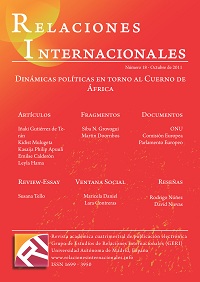Sovereignty in Africa: Quasi-Statehood and Other Myths in International Theory
Keywords:
Regime of sovereignty , post-colonial state , Democratic Republic of Congo/Zaire , Belgium , Switzerland, Africa, powerCopyright (c) 2011 Siba N'Zatioula GROVOGUI

This work is licensed under a Creative Commons Attribution-NonCommercial-NoDerivatives 4.0 International License.
Abstract
This chapter focuses on two oft-repeated errors. One is the notion that Western states uniformly possess a certain organic coherence generated by a purposeful fit between state and nation, a legitimate state desire to maintain this relation, a proven state capacity to defend itself against competing entities. The other is that post-colonial sovereignty constitutes an historical deviation from Western norms, both as a juridical fiction and an empirical reality. [...] To illustrate my points, I will consider the historical forms of sovereignty that Western hegemons envisioned for Belgium and Switzerland, on the one hand, and Congo/Zaire, on the other, during the last two centuries.





